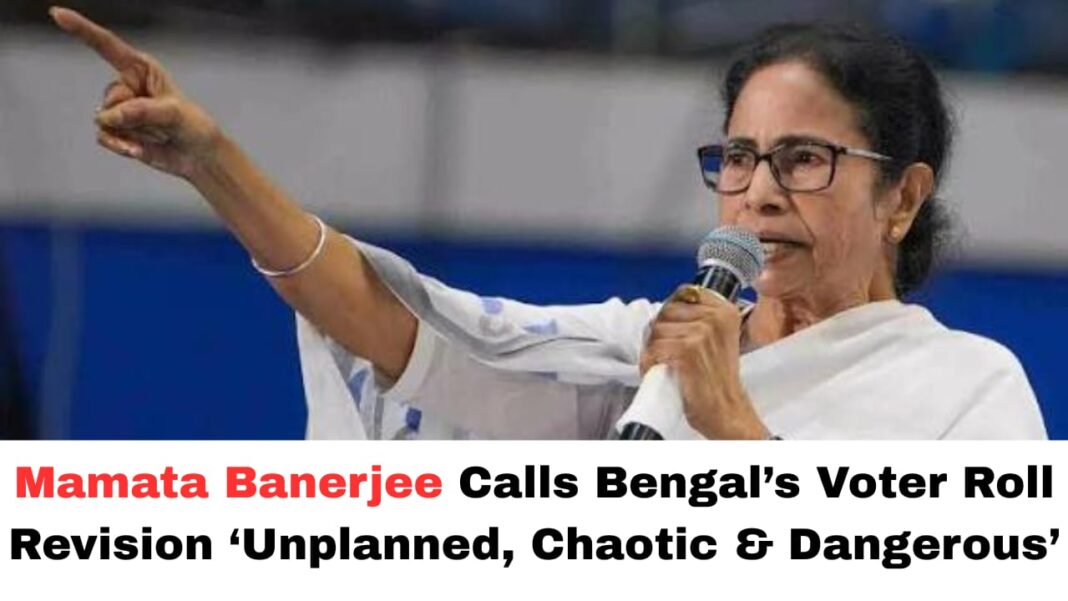Digital News Guru West Bengal Desk:
Mamata Banerjee Urges ECI to Halt SIR in Bengal, Warns of “Dangerous” Fallout
West Bengal Chief Minister Mamata Banerjee has sounded a strong alarm over the ongoing Special Intensive Revision (SIR) of electoral rolls in her state, calling the exercise “unplanned, chaotic and dangerous.” Her forceful letter to Chief Election Commissioner Gyanesh Kumar underscores deep-rooted concerns about the process — especially its impact on Ground-level officials and the risk to voter-list integrity.
The Core of the Complaint
In her letter, Mamata Banerjee accuses the ECI of imposing the SIR “without basic preparedness or adequate planning.” She argues that critical gaps in training, confusion over mandatory documentation, and unclear communication have crippled the process right from the start. According to her, this structural unsoundness not only endangers officials but also citizens.

Booth-Level Officers (BLOs), she warns, are being pushed “far beyond human limits.” Many of them — including teachers, anganwadi workers, and frontline staff — are already juggling their regular duties, only to be burdened with door-to-door surveys and complex online data submissions. The CM alleges that due to inadequate training and repeated technical failures (server issues, data mismatches), many BLOs are struggling to complete their tasks accurately.
Human Cost Is Too High
Perhaps the most serious charge in her letter relates to the human cost of the SIR. Mamata points to the suicide of an anganwadi worker in Mal, Jalpaiguri, who was also serving as a BLO. She says this tragic death is not isolated — “several others” have reportedly died since the drive began.
These claims fuel her call for the ECI to immediately halt the exercise, warning that the continued pressure could lead to “irreversible consequences.”
Political Overtones: “Votebandi” and Alleged Coercion
Mamata’s criticism is not just technical — she frames the SIR as deeply political. In earlier remarks, she compared the review to a “votebandi” (a play on the word “notebandi” or demonetisation), suggesting that the voter-list exercise is being rushed for electoral advantage. She questions the timing of the drive, especially its launch just before state elections, and accuses the ECI and the ruling central government of using it to disenfranchise voters.
In her letter, she goes further: she alleges that the West Bengal Chief Electoral Officer’s office has resorted to intimidation. According to her, some BLOs have received “show-cause notices” and face disciplinary action, despite being reportedly overwhelmed by the workload.

ECI Response & Institutional Tensions
The Election Commission, however, appears undeterred. Chief Election Commissioner Gyanesh Kumar has stated that the SIR exercise will proceed in West Bengal, insisting that the commission is operating within its constitutional mandate under Article 324. He emphasized that state governments are obliged to provide personnel and support for the revision, and characterized resistance as unfounded.
This clash reflects deeper institutional tensions: a legally mandated electoral audit driven by the ECI on one hand, and a state government arguing that the ECI’s pace and method are overreaching and risk undermining democratic rights.
Risks to Electoral Legitimacy
Mamata Banerjee’s letter raises profound questions about the credibility of voter lists and the fairness of the SIR itself. She warns that officials, pressured to finish their work, might make incorrect entries — which could lead to the disenfranchisement of genuine voters. The specter of rushed data gathering, undertrained staff, and punitive oversight could undermine the legitimacy of the entire revision.
Furthermore, she argues, the drive’s compressed timeline (she claims a process that typically takes years is being squeezed into just a few months) exacerbates these risks.
Broader Political Stakes
Beyond administrative concerns, Mamata’s opposition to SIR taps into a larger political narrative. She and her party, Trinamool Congress (TMC), have warned that the exercise could disproportionately impact vulnerable communities, including migrants and residents with limited documentation. Critics argue that if names are removed incorrectly, it could alter political representation ahead of elections.
On the other side, some voices supporting SIR argue that it is essential to clean up voter rolls, remove ineligible or duplicate entries, and strengthen electoral integrity. The ECI justifies the drive under its constitutional duty, but the mistrust sown by Mamata’s allegations could have long-term implications for public confidence.

What’s Next?
With the issue now formally raised, the onus is on the Election Commission to either address Banerjee’s concerns or face growing political pressure. Key next steps could include:
- ECI Intervention: The commission may need to pause or recalibrate its approach, perhaps by extending timelines, improving training, or offering relief to BLOs.
- Third-party Audit: Given the gravity of the allegations, independent bodies (civil society, electoral watchdogs) might call for an audit of the SIR’s procedures and data quality.
- Political Mobilization: Mamata’s vocal resistance could galvanize opposition parties in other states with SIR, especially if they see it as a challenge to electoral fairness.
- Legal Action: If BLOs or citizens mount legal challenges, courts may be asked to intervene in timeline extensions, methodology, or disenfranchisement risks.
You May Also Read: Anmol Bishnoi Deported to India, NIA Secures 11-Day Custody








